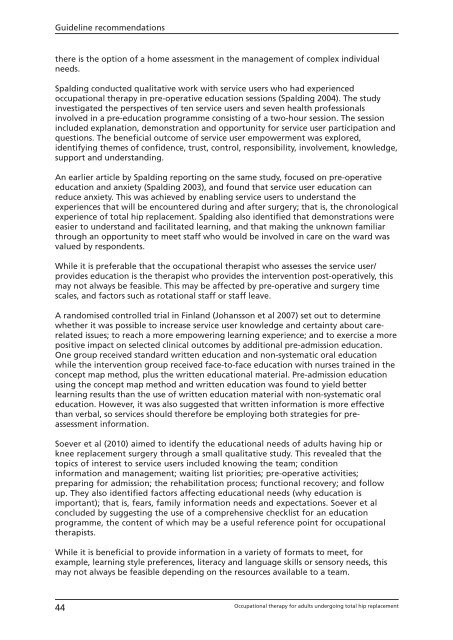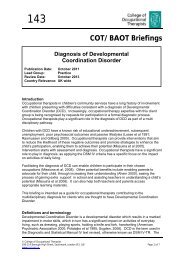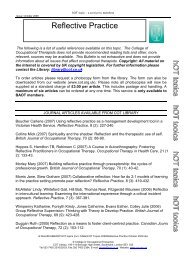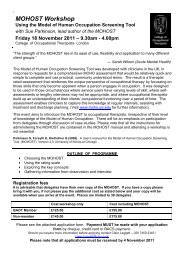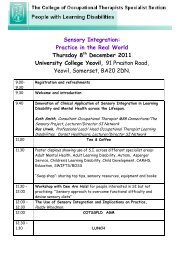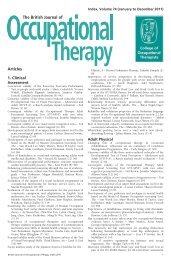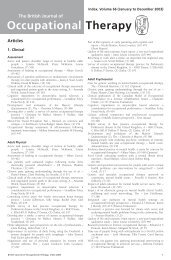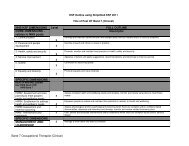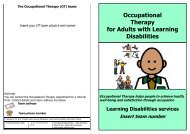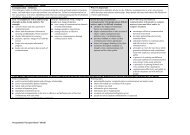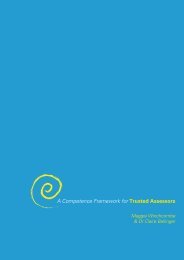Total hip replacement - College of Occupational Therapists
Total hip replacement - College of Occupational Therapists
Total hip replacement - College of Occupational Therapists
Create successful ePaper yourself
Turn your PDF publications into a flip-book with our unique Google optimized e-Paper software.
Guideline recommendations<br />
there is the option <strong>of</strong> a home assessment in the management <strong>of</strong> complex individual<br />
needs.<br />
Spalding conducted qualitative work with service users who had experienced<br />
occupational therapy in pre- operative education sessions (Spalding 2004). The study<br />
investigated the perspectives <strong>of</strong> ten service users and seven health pr<strong>of</strong>essionals<br />
involved in a pre- education programme consisting <strong>of</strong> a two- hour session. The session<br />
included explanation, demonstration and opportunity for service user participation and<br />
questions. The beneficial outcome <strong>of</strong> service user empowerment was explored,<br />
identifying themes <strong>of</strong> confidence, trust, control, responsibility, involvement, knowledge,<br />
support and understanding.<br />
An earlier article by Spalding reporting on the same study, focused on pre- operative<br />
education and anxiety (Spalding 2003), and found that service user education can<br />
reduce anxiety. This was achieved by enabling service users to understand the<br />
experiences that will be encountered during and after surgery; that is, the chronological<br />
experience <strong>of</strong> total <strong>hip</strong> <strong>replacement</strong>. Spalding also identified that demonstrations were<br />
easier to understand and facilitated learning, and that making the unknown familiar<br />
through an opportunity to meet staff who would be involved in care on the ward was<br />
valued by respondents.<br />
While it is preferable that the occupational therapist who assesses the service user/<br />
provides education is the therapist who provides the intervention post- operatively, this<br />
may not always be feasible. This may be affected by pre- operative and surgery time<br />
scales, and factors such as rotational staff or staff leave.<br />
A randomised controlled trial in Finland (Johansson et al 2007) set out to determine<br />
whether it was possible to increase service user knowledge and certainty about carerelated<br />
issues; to reach a more empowering learning experience; and to exercise a more<br />
positive impact on selected clinical outcomes by additional pre- admission education.<br />
One group received standard written education and non- systematic oral education<br />
while the intervention group received face- to- face education with nurses trained in the<br />
concept map method, plus the written educational material. Pre- admission education<br />
using the concept map method and written education was found to yield better<br />
learning results than the use <strong>of</strong> written education material with non- systematic oral<br />
education. However, it was also suggested that written information is more effective<br />
than verbal, so services should therefore be employing both strategies for preassessment<br />
information.<br />
Soever et al (2010) aimed to identify the educational needs <strong>of</strong> adults having <strong>hip</strong> or<br />
knee <strong>replacement</strong> surgery through a small qualitative study. This revealed that the<br />
topics <strong>of</strong> interest to service users included knowing the team; condition<br />
information and management; waiting list priorities; pre- operative activities;<br />
preparing for admission; the rehabilitation process; functional recovery; and follow<br />
up. They also identified factors affecting educational needs (why education is<br />
important); that is, fears, family information needs and expectations. Soever et al<br />
concluded by suggesting the use <strong>of</strong> a comprehensive checklist for an education<br />
programme, the content <strong>of</strong> which may be a useful reference point for occupational<br />
therapists.<br />
While it is beneficial to provide information in a variety <strong>of</strong> formats to meet, for<br />
example, learning style preferences, literacy and language skills or sensory needs, this<br />
may not always be feasible depending on the resources available to a team.<br />
44<br />
<strong>Occupational</strong> therapy for adults undergoing total <strong>hip</strong> <strong>replacement</strong>


